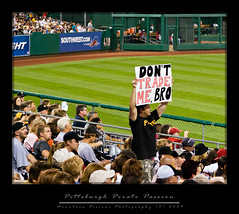 What happened over the last decade in Pittsburgh makes you wonder just how serious that fan is. When the situation in a major league city is so bad that the fans in that city wonder if they will be traded, you know you are doing a bad job as a baseball organization or a business in general.
What happened over the last decade in Pittsburgh makes you wonder just how serious that fan is. When the situation in a major league city is so bad that the fans in that city wonder if they will be traded, you know you are doing a bad job as a baseball organization or a business in general.
If you want a business to succeed it requires initial investment, and continuous reinvestment. Great example of this would be both Merck and Coca-Cola. Coke thought it had the market forever, and just produced Coca-Cola and watched itself slip into obscurity despite being among the most recognizable symbols in the world. Merck, sitting on ridiculously long drug patents and proving patents DON'T spur innovation, shut down most of it's R&D division in the 1990s. A company that invents drugs can't grow without new drugs, and unfortunately R&D spending creates drugs.
On the flip side, the NY Yankees are a shining example of building a business, and turning it into an empire – the “Evil Empire”- via the principle of reinvestment. Yes, New York is the nations #1 media market, but it's also a place where competition for revenue is high. The Yankees share a city with other high profile events, a second baseball team who is in the national league (New York is a traditionally national league town), and they are within a 1.5-2.5 hour drive of 2 other major markets. Still, the Yankees have managed to capitalize on every possible aspect of revenue.
When George Steinbrenner purchased the team in 1973 for $10 million the who could have predicted the Yankees would be the worlds first $1B sports franchise, or that Yankee Stadium in it's current location could draw 3M and then 4M. No, not even George Steinbrenner believed he could draw over 3M at 161st St.
So how did he do it? How did he build the “Evil Empire”? Simple really, the Yankees were (and still are) an old school, rich mans pissing match. It's the essence of a sports franchise, Steinbrenner built it to win while innovating, he built it for championships, he reinvested the earnings into the team year after year like a business. It was a commitment to winning above all else that led to a quality product.
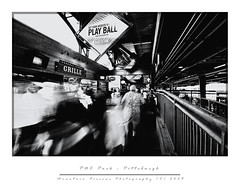 Remember the movie line, “If you build it, he will come.” “Build what,” he says to the voice? “Build a winner and they will come from miles and miles around. They will come to Cleveland, they will be bored, they will get back in their cars and they will drive to Pittsburgh. They will drive towards the lights, they will come to the gate, ask for a ticket, and they won't care about the price. “$30” you say, “I'll take 4,” they'll say. They'll buy jerseys, hats and giant foam fingers, sit in their seats eating hotdogs and Cracker Jacks. If you build it, THEY will come!”
Remember the movie line, “If you build it, he will come.” “Build what,” he says to the voice? “Build a winner and they will come from miles and miles around. They will come to Cleveland, they will be bored, they will get back in their cars and they will drive to Pittsburgh. They will drive towards the lights, they will come to the gate, ask for a ticket, and they won't care about the price. “$30” you say, “I'll take 4,” they'll say. They'll buy jerseys, hats and giant foam fingers, sit in their seats eating hotdogs and Cracker Jacks. If you build it, THEY will come!”
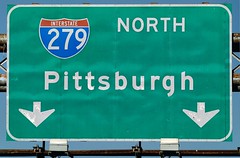
 And now we turn back to Pittsburgh. It's a team owned and run to make a profit first and foremost, just like many other franchises in baseball, winning is secondary. If they did win, sure it would be magical, after all, success usually isn't purely based on luck. You need a few good players here and there on a 25 man roster.
And now we turn back to Pittsburgh. It's a team owned and run to make a profit first and foremost, just like many other franchises in baseball, winning is secondary. If they did win, sure it would be magical, after all, success usually isn't purely based on luck. You need a few good players here and there on a 25 man roster.
Bold statement, eh? I mean Pittsburgh is a beaten down blue collar industrial town, nestled in a country that doesn't produce anything anymore. It's a city that peaked in the 1950s and has been headed downward for decades. Right?
Wrong!
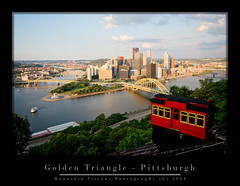
 Pittsburgh has a bad reputation, which is truly a shame. It's honestly one of the most picturesque cities I have been to. Sitting at the confluence of 3 rivers, flanked by deep ravines and steep hillsides that give commanding views of the cities unique architecture, and 455 bridges. No, I didn't add a number via a typo, Pittsburgh has the most (piered) bridges of any city in the world, many of which are magnificent.
Pittsburgh has a bad reputation, which is truly a shame. It's honestly one of the most picturesque cities I have been to. Sitting at the confluence of 3 rivers, flanked by deep ravines and steep hillsides that give commanding views of the cities unique architecture, and 455 bridges. No, I didn't add a number via a typo, Pittsburgh has the most (piered) bridges of any city in the world, many of which are magnificent.
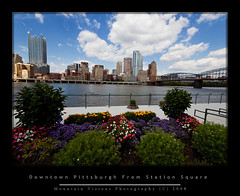 Oh, and it's now one of America's cleanest cities, after a long stretch of being on the American Lung Associations dirtiest. At times it held the lofty honor of dirtiest.. It's also a huge sports town, but another surprise is that it is a city with a lot of culture. Despite the blue collar nature of the city, it's also a city of old money and education.
Oh, and it's now one of America's cleanest cities, after a long stretch of being on the American Lung Associations dirtiest. At times it held the lofty honor of dirtiest.. It's also a huge sports town, but another surprise is that it is a city with a lot of culture. Despite the blue collar nature of the city, it's also a city of old money and education.  The result is a lot more culture than you'd expect. Pittsburgh is a city that could have completely died, but it reinvented itself impressively.
The result is a lot more culture than you'd expect. Pittsburgh is a city that could have completely died, but it reinvented itself impressively.
Of course, it's only a city of less than 400,000 people, with a total metropolitan population of 2.5M people. Pittsburgh is probably barely big  enough to support a sports team, let alone 3 professional teams, and a few colleges. Naturally, under the best of circumstances Pittsburgh won't be able to outspend the Yankees, or even the Seattle Mariners. However, what the ownership of the Pirates has done over the last decade is simply
enough to support a sports team, let alone 3 professional teams, and a few colleges. Naturally, under the best of circumstances Pittsburgh won't be able to outspend the Yankees, or even the Seattle Mariners. However, what the ownership of the Pirates has done over the last decade is simply 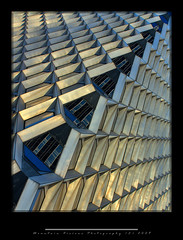 criminal.
criminal.
Most people don't realize that baseball, while not having a salary cap, has both a luxury tax and revenue sharing. What this does is penalize teams like the Yankees for spending a lot of money. How it works is essentially redistribution of wealth. The Yankees generate gigantic sums of money, which they then spend, and pay a tax on the excess spending. MLB then distributes this money, along with other MLB revenue (national TV revenue, official apparel, sponsorships, etc) to small market teams. The Yankees don't receive MLB revenue, they pay their own way, and then some.
What does Pittsburgh do with it's revenue sharing proceeds? Darn good question, and if you can tell me then you are a step ahead of me. There is $400 million floating around somewhere from 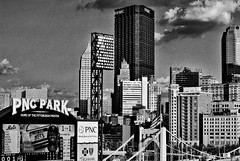 the last decade that Pittsburgh ownership is hiding. Certainly they haven't spent it on their team, nor the beautiful stadium which was publicly funded. Oh yeah, I forgot to mention PNC Park is a class ballpark. It would be beautiful in Staten Island, New York, but with the waterfront location, the bridges and skyline in the backdrop, it is simply the best park in baseball.
the last decade that Pittsburgh ownership is hiding. Certainly they haven't spent it on their team, nor the beautiful stadium which was publicly funded. Oh yeah, I forgot to mention PNC Park is a class ballpark. It would be beautiful in Staten Island, New York, but with the waterfront location, the bridges and skyline in the backdrop, it is simply the best park in baseball. 
So where is the $400 million? Not on the field, not in the stadium, not in scouting, not in signing the good young players they have had to long term contracts on the cheap, and overall not in building a product or business that will grow. It's definitely not in hiring baseball people,  because every time Pittsburgh gets a guy good enough to sell a jersey with his name on it, he is traded for 4 guys that cumulatively don't equal his level of play now or ever.
because every time Pittsburgh gets a guy good enough to sell a jersey with his name on it, he is traded for 4 guys that cumulatively don't equal his level of play now or ever.
The Pirates are a joke, not because Pittsburgh can't support them, they are a joke because someone is milking them for the revenue stream.
JFK said, “Ich bin ein Berliner” (loosely translated, “I am a jelly doughnut”)
I say, “I am a Pittsburgher.” (loosely translated, “I am tired of being ripped off while watching bad baseball”)
Mr Selig, TEAR DOWN THIS WALL of ownership picking owners who won't compete. End the repression, sell the team to Mark Cuban, and watch a yearly pissing match between the Steinbrenners and Mr Cuban develop. Lets get some competition in the game, lets bring back the spoiled rich owners who play fantasy baseball with real money. Lets bring baseball back to it's roots, we don't want parity like football and basketball. Parity equals average, which means low quality. Parity is the restaurant with 3 star reviews; you want 5 stars and a certified master chef. We want competitive rivalries, we want dynasties, we want spectacular!
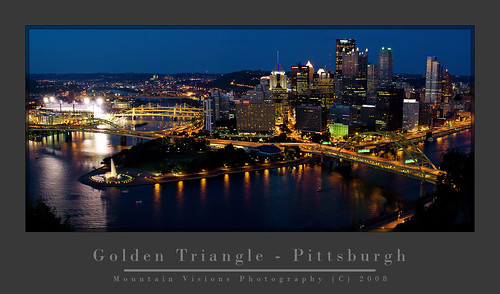









Awesome post! I'm forwarding this story to some family and friends that live in Pittsburgh. Also, some of the photos don't link back to your flickr stream, and some don't blow up to a nice large size.
ReplyDeleteI'm heading up there the weekend after new year's, 1st to the 3rd, and really hoping to see some of those sites you photographed in this and earlier blogs... esp. that restaurant you mentioned.
-Somanna
Thanks for the comments Somonna, don't remember which restaurant, but the two I liked are the Church Brewery and I think Fat Heads was a pretty decent pub (good beer selection, better than average food). It's cool city though. Have fun up there.
ReplyDelete